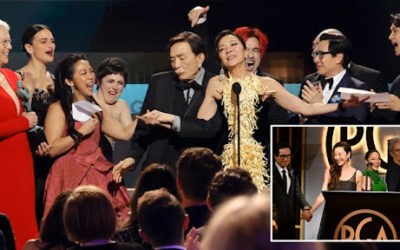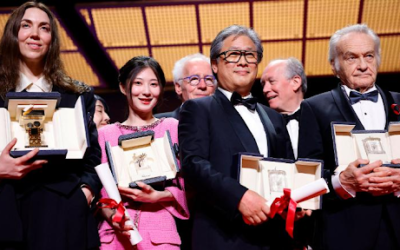Source: IndieWire
Since its inception in 1957, the BFI London Film Festival, held and organized by the British Film Institute (BFI) and usually taking place during the month of October, has been revered as one of the most prestigious cinematic events in the United Kingdom. Though perhaps not as renowned as some of Europe’s other major film festivals like those in Berlin and Venice, the festival has provided a means for filmmakers around the world to show off the best of their creations, claiming to be dedicated to showing “new discoveries from important and exciting talents in world cinema”. That goal has been present from the beginning, with the inaugural festival screening such international classics as Akira Kurosawa’s “Throne of Blood” and Ingmar Bergman’s “The Seventh Seal”, and in the decades since, many fine works of cinema have opened, closed, or at least been screened at some point during the duration of a given festival. In recent years, the festival has bookended itself with an array of well-received and awards-worthy films; last year’s event, for example, opened with Jeymes Samuel’s modern Western “The Harder They Fall” and closed with Joel Cohen’s “The Tragedy of Macbeth”, both of which were met with generally positive reception.
Living up to those films, as well as those that were exhibited in the time between their screenings, is no easy task, but fortunately, the most recent event has proven itself capable of succeeding in that very task. Taking place between October 5th and 16th of this year, the 2022 BFI London Film Festival provided twelve days worth of film-going at a variety of venues throughout London.Opening the festival was “Roald Dahl’s Matilda the Musical”, a cinematic adaptation of the 2010 stage musical (itself an adaptation of Dahl’s 1988 literary work), and closing it was “Glass Onion: A Knives Out Mystery”, a sequel to Rian Johnson’s critically acclaimed 2019 whodunnit “Knives Out”. Critical reviews for both of these films have so far been mostly positive, justifying their status as the films to open and close the festival, but it’s the films that were shown in the time between that are much more noteworthy, especially those fortunate enough to receive specific awards recognition from the festival.
Taking home the BFI London Film Festival’s most highly coveted award, one simply titled Best Film, was “Corsage”, a biopic centered around Empress Elisabeth of Austria-Hungary from director Maria Kreutzer. Submitted to represent the nation of Austria and vy for the Academy Award nomination for Best International Feature, “Corsage” will certainly benefit from the boost of attention provided by winning the festival’s top prize, especially considering claims that festival judges were “seduced by [leading actress] Vicky Krieps’ sublime performance of a woman out of time trapped in her own iconography and her rebellious yearning for liberation”. Regardless of what happens from this point though, Kreutzer herself seems to be ecstatic about receiving this award, making her appreciation of the festival’s decision clear in her acceptance speech. “I want to say thank you to the members of the jury for choosing our film and giving us this beautiful award,” Kreutzer says in her speech. “For me this award, which is an award for the film, is not only my award it belongs to all of us. The most beautiful thing about my job is to collaborate with so many great creatives and artists and create something together day by day without knowing how it will turn out… For all of us I’m so happy that it turned out so well and that people love the film so much…This award is for everyone on my team. It’s hard to find the right words right now, I’m happy!”
Another film, meanwhile, found further success in winning the the Grierson Award in Documentary Competition after already proving to be a major hit at the Sundance Film Festival earlier this year. That film was Shaunak Sen’s “All That Breathes”, which depicts the joint efforts of two brothers in their rescue of birds throughout the nation of India. This is another film that many have looked at as a major contender for the Academy Award for Best Documentary Feature, and a nomination has only become likelier following its win at the London Film Festival. “The winner of this year’s award is a film that through an intimate lens reveals the beauty of kinship and the struggle for survival in a time of increasing social and environmental collapse,” jurors for the Documentary Competition wrote in praise of Sen’s film. “This masterful work is thrilling evidence of the present and future of non-fiction filmmaking. This is pure cinema.”
Like Kreutzer, Sen proved to be very delighted by this win, using his speech to discuss how much recognition from this festival in particular means to him. “The film has very deep connections to the UK and London in particular,” Shaunak Sen claims in his acceptance speech. “Our wonderful producers are all based in London, attending the screenings at the London Film Festival was excellent personally for me because apart from the responses from the packed houses also it became a warm gathering of other crew members… Most importantly, while the awards are fabulous as a kind of recognition for the work we have put in, it feels special because what awards like this do is give traction to the truly singular work that our protagonists, the brothers Nadeem and Saud, do. I’m absolutely thrilled and so, so happy.”
In addition to those films, two other works of cinema were acknowledged and awarded by the jury and audience of the BFI London Film Festival. Receiving the Sutherland Award in First Feature Competition, an award designated for first-time feature filmmakers, was “1976”, which hails from the nation of Chile and was directed by newcomer Manuela Martelli. The Audience Award, meanwhile, went to the documentary feature “Blue Bag Life”, directed by Alex Fry, Rebecca Lloyd-Evans, and Lisa Selby. Still, all of these were just a small handful of the films screened at this year’s BFI London Film Festival, and even the ones that were not recognized with a major award are still more than worthy of recommendation. This festival is considered one of the United Kingdom’s biggest film-going events for a reason, and its most recent lineup only further strengthens that status.




